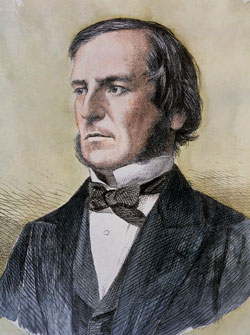George Boole (nonfiction): Difference between revisions
(Created page with "thumb|George Boole.'''George Boole''' (/ˈbuːl/; 2 November 1815 – 8 December 1864) was an English mathematician, educator, philosopher and logici...") |
No edit summary |
||
| Line 1: | Line 1: | ||
[[File:George_Boole.jpg|thumb|George Boole.]]'''George Boole''' (/ˈbuːl/; 2 November 1815 – 8 December 1864) was an English mathematician, educator, philosopher and logician. | [[File:George_Boole.jpg|thumb|George Boole.]]'''George Boole''' (/ˈbuːl/; 2 November 1815 – 8 December 1864) was an English mathematician, educator, philosopher and logician. | ||
He worked in the fields of differential equations and algebraic logic, and is best known as the author of The Laws of Thought (1854) which contains Boolean algebra. Boolean logic is credited with laying the foundations for the information age. | He worked in the fields of differential equations and algebraic logic, and is best known as the author of ''The Laws of Thought'' (1854) which contains [[Boolean algebra (nonfiction)|Boolean algebra]]. Boolean logic is credited with laying the foundations for the information age. | ||
Boole maintained that: | Boole maintained that: | ||
| Line 11: | Line 11: | ||
== Nonfiction cross-reference == | == Nonfiction cross-reference == | ||
* [[Boolean algebra (nonfiction) | |||
* [[Mathematician (nonfiction)]] | * [[Mathematician (nonfiction)]] | ||
Revision as of 16:44, 26 July 2017
George Boole (/ˈbuːl/; 2 November 1815 – 8 December 1864) was an English mathematician, educator, philosopher and logician.
He worked in the fields of differential equations and algebraic logic, and is best known as the author of The Laws of Thought (1854) which contains Boolean algebra. Boolean logic is credited with laying the foundations for the information age.
Boole maintained that:
No general method for the solution of questions in the theory of probabilities can be established which does not explicitly recognise, not only the special numerical bases of the science, but also those universal laws of thought which are the basis of all reasoning, and which, whatever they may be as to their essence, are at least mathematical as to their form.
Fiction cross-reference
Nonfiction cross-reference
- [[Boolean algebra (nonfiction)
- Mathematician (nonfiction)
External links:
- George Boole @ Wikipedia
